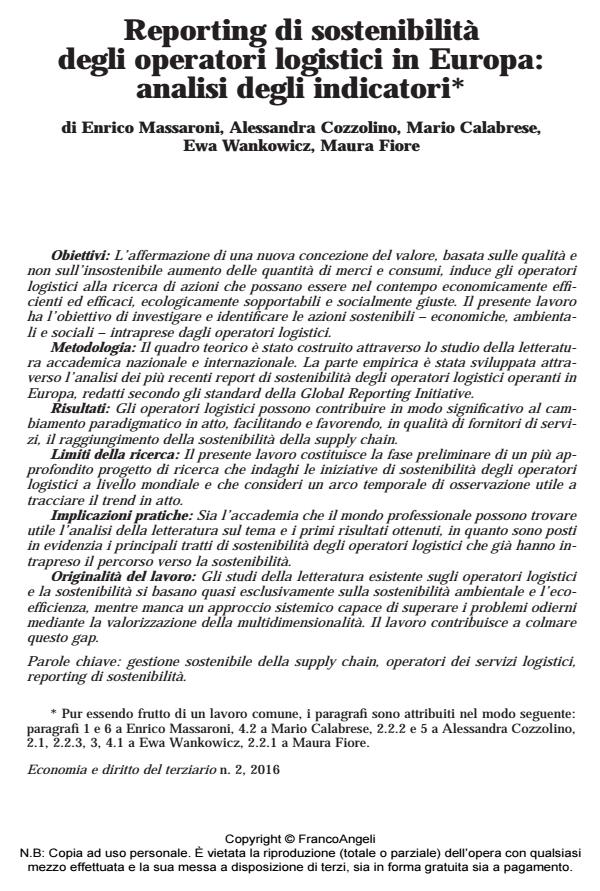Reporting di sostenibilità degli operatori logistici in Europa: analisi degli indicatori
Journal title ECONOMIA E DIRITTO DEL TERZIARIO
Author/s Enrico Massaroni, Alessandra Cozzolino, Mario Calabrese, Ewa Wankowicz, Maura Fiore
Publishing Year 2016 Issue 2016/2
Language Italian Pages 32 P. 303-334 File size 475 KB
DOI 10.3280/ED2016-002005
DOI is like a bar code for intellectual property: to have more infomation
click here
Below, you can see the article first page
If you want to buy this article in PDF format, you can do it, following the instructions to buy download credits

FrancoAngeli is member of Publishers International Linking Association, Inc (PILA), a not-for-profit association which run the CrossRef service enabling links to and from online scholarly content.
Purposes of the paper: the development of a new concept of value, based on quality and not on unsustainable increase in quantity of goods and consumption, leds logistics providers to the search of actions that would be cost-efficient and effective at the same time, ecologically sustainable and socially fair. This paper wants to investigate and identify sustainable actions - economic, environmental and social - undertaken by logistics providers.
Methodology: the theoretical framework has been realised through the study of the academic literature, both nationally and internationally. The empirical section has been created through analysis of the latest sustainability reports of logistics providers operating in Europe, achieved in accordance with the standards of the Global Reporting Initiative.
Findings: logistics providers may contribute significantly to the paradigm shift now in progress, by facilitating and encouraging, as service providers, the achievement of sustainability in supply chain management.
Research Limits: this work is the preliminary stage of a more detailed research project that requires the sustainability initiatives about worldwide logistics providers and considers a period of observation useful to trace the trends in place.
Practical implications: Both the Academy and the business world can find useful the analysis of the literature on the subject and the first results gained, as the main features of sustainability of logistics providers, which have already embarked on the path towards sustainability, are highlighted.
Originality of the paper: the studies of the existing literature on logistics providers and sustainability are based almost exclusively on environmental sustainability and the eco-efficiency, while a systemic approach able to overcome problems through the enhancement of multidimensionality lacks. The work helps to fill this gap.
Keywords: Sustainable supply chain management, logistics service providers, sustainability reporting
Jel codes: M15IT.
Enrico Massaroni, Alessandra Cozzolino, Mario Calabrese, Ewa Wankowicz, Maura Fiore, Reporting di sostenibilità degli operatori logistici in Europa: analisi degli indicatori in "ECONOMIA E DIRITTO DEL TERZIARIO " 2/2016, pp 303-334, DOI: 10.3280/ED2016-002005